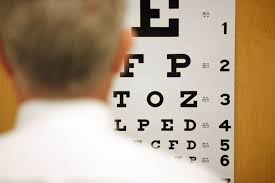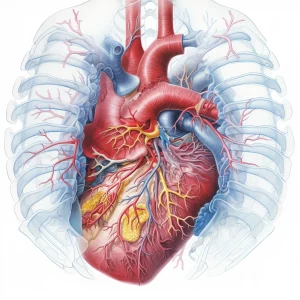Flying an aircraft is a serious responsibility. One mistake can easily turn into a disaster with tragic consequences for everyone involved. Due to this, there are a number of reasons that you can be disqualified from ever becoming a pilot. These include medical conditions or physical impairments, trouble with the law, and violation of FAA regulations.
Vision Impairments
Depending on the type of flying you would like to do, commercial or recreational, you will need an aviation medical certificate. For a third class medical certificate, which is needed to obtain a private pilot license, you must have distant vision of 20/40, with or without correction. For first and second class medical certificates, which are required for commercial flying, you must have distant vision of 20/20 and 20/40 vision at 32 inches, with or without correction. Take note that vision correction is allowed, meaning you can still be a pilot if you need glasses. If you cannot meet these vision requirements, then you will be disqualified from being a pilot.

Hearing Issues
While vision may seem like the most important sense when it comes to flying, your ability to hear is equally as important. You must be able to hear communications from air traffic control, as well as any sounds that could be a sign of damage to the aircraft. For this reason, the FAA requires that pilots have the ability to hear an average conversational voice at a distance of 6 feet without the use of a hearing aid.
Hearing ability is measured using audiometric testing. If a hearing aid is required, then a waiver may be granted if you can demonstrate your ability to operate a plane while using the hearing aid. If you cannot reach the appropriate level of hearing ability even while using a hearing aid, then there is no way you will be able to pilot a plane.
Cardiovascular Conditions
 Your heart health will also be considered when deciding if you are fit to be a pilot. A heart attack while in control of a plane can result in disastrous consequences not only for yourself, but also for any passengers and even people on the ground below. Heart conditions that will disqualify you from being a pilot include:
Your heart health will also be considered when deciding if you are fit to be a pilot. A heart attack while in control of a plane can result in disastrous consequences not only for yourself, but also for any passengers and even people on the ground below. Heart conditions that will disqualify you from being a pilot include:
- Heart Disease
- Cardiac Arrhythmias
- Heart Valve Disorders
Please note that this is not a complete list. Any disorder of the heart, even a seemingly small one, can disqualify you from being a pilot if there is any chance that it could cause a medical emergency while flying.
Neurological Disorders
Neurological disorders can cause issues with cognitive abilities, motor function, and consciousness, and for this reason the FAA takes them very seriously. Any history of epilepsy will automatically disqualify you from being a pilot. Even if you have your seizures under control, the FAA views it as too great a risk to allow you to be in control of an aircraft.
Additionally, if you have a history of migraines, especially ones accompanied by an aura, are likely to see you disqualified. Besides epilepsy and migraines, any condition which causes neurological symptoms can cause you to be disqualified from becoming a pilot.
Mental Health Conditions
Any mental health condition which affects judgment, behavioral control, emotional control, or mental capacity can disqualify you from being a pilot. Most mental health conditions will not result in an automatic disqualification, but will require a decision by an FAA medical examiner. Such conditions include:
- ADHD
- Bipolar disorder
- Suicide attempts
- Psychosis
- Personality disorder
- Any other disorder affecting judgment, behavioral and emotional control, or mental capacity
The medical examiner will investigate your medical condition through interviewing you and reviewing your records. They will then decide whether or not you should be disqualified from becoming a pilot.
Criminal Record
Having a felony on your record will not disqualify you from becoming a pilot. However, if you are convicted of an alcohol or drug related offense then you cannot apply for a pilot certificate for one year after your conviction. If you are charged with an alcohol or drug related offense while you already have a pilot’s license, it may be suspended for up to one year. It should be noted that if you want to fly commercially, many employers of pilots will have their own guidelines regarding criminal offenses, and your criminal history may cause them to not hire you.
Drug and Alcohol Abuse
Actively abusing drugs or alcohol is an automatic disqualification from becoming a pilot. If you have a history of drug and alcohol abuse, whether or not you are disqualified will be left to the discretion of the medical examiner. They will do an investigation to determine if you are at risk of abusing again, which could pose a risk to being a pilot.
Lack of Training Hours
When working towards a pilot license using a specific training program, such as the F.A.R. Part 141 course or the F.A.R Part 61 course, you are required to complete a specific number of training hours. The amount of hours varies on what specific pilot certification you want to obtain. Regardless of what certificate you are pursuing, failure to complete the required training hours will result in you being disqualified from being a pilot until the required hours are met.
Failed Exam
As mentioned earlier, to become a pilot you will need to pass a medical exam and be granted a medical certificate. Medical certificates come in different levels, with the level you need being dependent on the type of license you are hoping to acquire. A private pilot license requires a third class medical certificate, while a commercial pilot license requires a second class medical certificate. An FAA medical examiner will conduct the exam and determine if you meet the requirements for the specific certificate you need. Failing this exam will result in automatic disqualification from becoming a pilot.
Non-Compliance with FAA Regulations
When you’re a pilot there are hundreds of FAA regulations you must adhere to. Failure to comply with these regulations will result in disciplinary action. First time offenders may receive a fine or a suspension of their pilot license. However, repeated non-compliance or flagrant disregard of regulations which cause a serious safety issue, will result in disqualification from being a pilot, and never flying an aircraft again. Regulations are put in place for the safety of everyone, and the utmost care should be taken to ensure you are always complying with them.
Andrews, M. (2016, March 11). Guideline Group, eye doctors disagree on vision tests for seniors. WBEZ. https://www.wbez.org/health/2016/03/11/guideline-group-eye-doctors-disagree-on-vision-tests-for-seniors
Mwewa, M. (2023, August 22). The cardiovascular system. Kinnu. https://kinnu.xyz/kinnuverse/science/human-physiology/the-cardiovascular-system/
